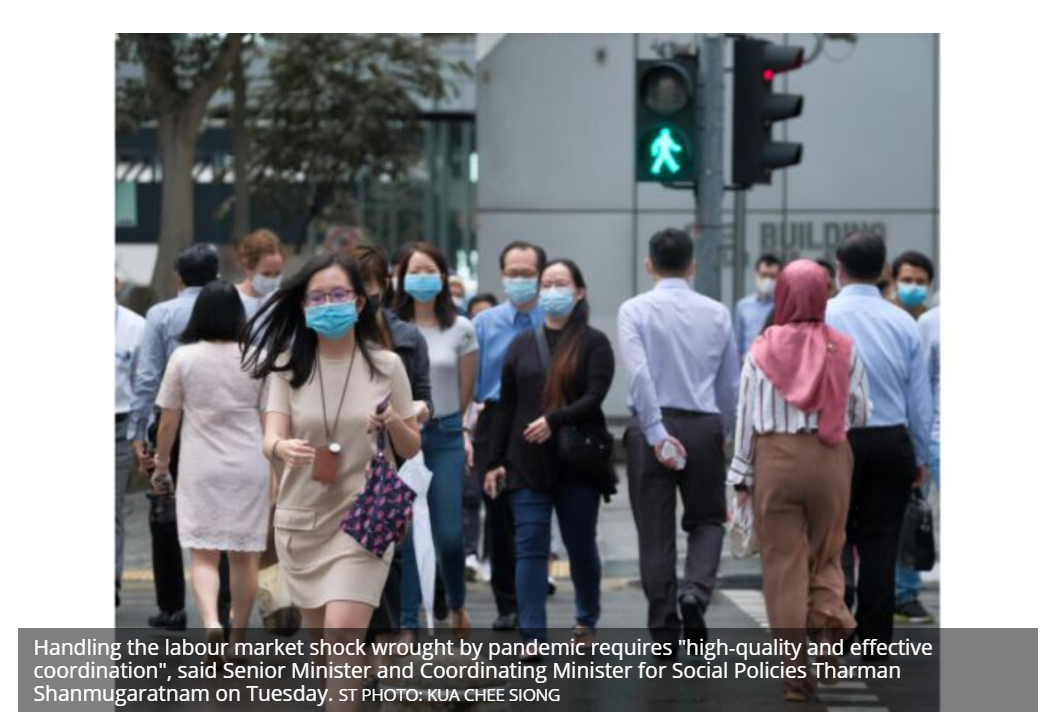Singapore: Labour recovery from Covid-19 shock cannot be left to market forces: Tharman
HANDLING the labour market shock wrought by the Covid-19 pandemic requires “high-quality and effective coordination”, said Senior Minister and Coordinating Minister for Social Policies Tharman Shanmugaratnam on Tuesday, at the Institute of Policy Studies (IPS) Singapore Perspectives 2021 conference.
Singapore’s approach is not just to put people back at work as quickly as possible, but to find the best match for their skills and human capital, he said. To achieve both speedy job-matching and good matches, coordination is key. “You can’t leave it to the market,” he stressed.
Every modern economy must have this capability, said Mr Tharman, who chairs the National Jobs Council that was formed during the pandemic to identify and develop jobs and training opportunities.
He was speaking in the first of nine online forums, on jobs and skills. Other forum sessions in the conference are scheduled for Jan 14, 19, and 25.
Singapore has to do two things at the same time, said Mr Tharman – recover from the pandemic crisis, and gear the country for an economic future that is already unfolding.
On the labour front, the objective is to ensure enough jobs for people, as well as “a broader distribution of good jobs” which pay fairly, provide security, and give a sense of satisfaction.
Beyond dealing with the Covid-19 shock, coordination is also needed in the continued push for lifelong learning, he added.
Worldwide, there is a great inequality in participation in lifelong learning, with a much lower rate for blue-collar workers. Addressing this requires coordination, institutions, and support from the state, Mr Tharman said. “Employers on their own will typically want to train their workers for today’s job… They don’t have an incentive to train workers for their next career.”
The government thus has to step in and strike a balance between helping firms to have a competitive and skilled workforce for today, and assisting individuals to stay competitive for the future.
Mr Tharman also spoke on the challenge of raising incomes at the bottom, and Singapore’s approach that combines the progressive wage model (PWM), Workfare to top up wages, and economic strategies for job creation.
On the much-debated issue of a minimum wage versus the “minimum wage plus” PWM, he said these were not different philosophically, but in design and application. What matters is the impact on the least skilled and most vulnerable workers.
Unlike many advanced countries where youth unemployment is the main concern, the key group in Singapore is the older generation who did not have a chance to have an education, the minister said. That is why the fine-grained PWM approach is needed.
As for job creation, Mr Tharman noted that in Singapore, the higher-skilled end of the workforce is essentially competing increasingly on a global scale, but lower-skilled workers are competing with lower-wage labour forces in the region.
Left purely to the market, businesses would base central functions in the Republic and outsource less-skilled work to the rest of Asia, he said. Singapore’s strategy in countering this and ensuring jobs are “sticky” in the country is to compete as a whole, rather than in separate segments of the workforce.
“The way to do it is to essentially create for companies the benefits of externalities in Singapore,” Mr Tharman said. This includes ensuring that there are advantages in co-locating higher and lower-skilled jobs, with an ecosystem that provides for reskilling, has good logistics, and that has many other companies doing the same, which should help to raise the overall quality of the labour force too.
Source: https://www.businesstimes.com.sg/government-economy/labour-recovery-from-covid-19-shock-cannot-be-left-to-market-forces-tharman


 Thailand
Thailand




